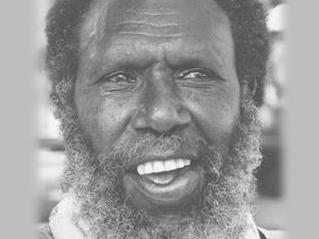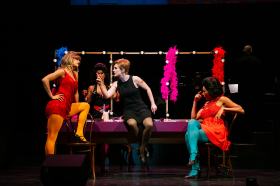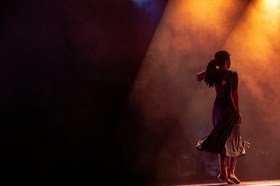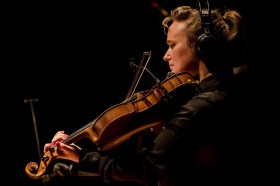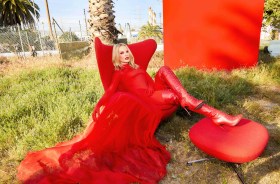Photo of Eddie Mabo by Jim McEwan, courtesy of QPAC.
The landmark High Court decision, known simply as Mabo, legally recognised that Indigenous people had a special relationship to the land that existed prior to colonisation. The Mabo Oration has grown out of this significant event and was driven by a desire to celebrate and pay tribute to the courage of Eddie Mabo and his colleagues in fighting a 10-year battle for justice and recognition.
In 2005 the Anti-Discrimination Commission Queensland (ADCQ) and Queensland Performing Arts Centre (QPAC) partnered to establish The Mabo Oration, a biennial public oration designed to contribute to a national conversation on Aboriginal and Torres Strait Islander cultures. Noel Pearson gave the powerful inaugural address in 2005 pointing out that the principles established by Mabo represented the best opportunity for resolution of colonial grievance between Indigenous and non-Indigenous Australians, noting that it was a ‘once in a nation’s lifetime opportunity’ and a ‘cornerstone for reconciliation.’ Dr Dawn Casey gave the sixth oration in 2015 entitled The Mabo Judgement: Was it the agent for change and recognition? which closely examined what still needed to be achieved to ensure the work that Eddie Mabo started would not be in vain.
The discussion continues today, particularly over the amendments and changes to the Native Title Act, as this year’s seventh Mabo Oration pointed out so clearly. This year the format was different from previous years, with a host and panel discussion with past and new orators and responders.
Commentator and Indigenous Affairs Editor at the ABC, Stan Grant, was a polished and excellent host involving all his panel and equally dividing time and questions. He commenced with where we are today, in light of the Mabo decision, asking some pertinent and provocative questions, while skilfully keeping away from the political blame game.
Panel members included the celebrated Professor Tom Calma AO, a Northern Territory elder statesman of Indigenous and human rights issues, who gave the Mabo address in 2009. His wisdom on all matters relating to native title and aboriginal land rights issues was apparent, having fought for Indigenous rights and empowerment for over 40 years. He suggested that a designated program to look at reparations was needed as the long-awaited follow-up to Mabo while self-government through the instigation of Treaties (as noted successfully for North American first peoples) had much to recommend it.
Highly respected Queensland elder, Dr Jackie Huggins, with a distinguished record of public service in reconciliation and social justice, shared these views, believing that the Native Title Act had not been the panacea that was promised or anticipated and there was a strong need for constitutional reform. But she was also optimistic in believing that, after Mabo, there is ‘No mountain high enough that we cannot climb.’ She spoke well and to the point.
The recently elected first female mayor of the Torres Strait, Vonda Malone, who has helped empower Indigenous women and create health initiatives, made important and valid points about future direction in social and economic equality. With an impressive background, lawyer Jayde Geia, who was only 5 years old when the Mabo decision came down, said that Mabo had inspired her to study law and fight for Indigenous rights. While seeming in awe of her well-credentialled colleagues, she was youthfully optimistic about the future of native title, quoting the current work being undertaken in Victoria and South Australia.
Dr Bryan Keon-Cohen, a Human Rights advocate who worked on the Mabo case and knows its outcomes and failings intimately, explained the native title issues in detail citing Australian governments being resistant to change. Like Tom Calma he strongly believes there is little political will in Australia from our current leadership to try and find solutions by creating Treaties, lndigenous commercial possibilities or self-government. He made a recommendation, supported by the 800 plus audience members present, that the Turnbull government at least be asked to respond to a report, Connection to Country, tabled in 2015, which addresses many of the issues discussed here.
At one point, Stan Grant stated that Captain Cook and colonisation is part of Australia’s history and part of Indigenous history, in the way that 60,000 years of Indigenous history is also part of the history of colonisation. We are all Australians and share this history and must therefore work together for reconciliation – we need to be integrated. Said simply, this received rapturous applause and was generous in the extreme. White Australians, as Jackie Huggins also stated, should acknowledge the issues and the shame and move on. It was astounding to learn that the Mabo decision of 1992, which included the words ‘a legacy of unadulterated shame’, has not been fully implemented by our political leaders over the past 25 years. Bryan Keon-Cohen suggested that Indigenous peoples take control of their own destiny, set up a Truth and Justice Commission and be trail blazers, pushing forward with their long-overdue native title rights while following the leadership of Eddie Mabo himself. This appeared to have much support in the theatre, and not only from Indigenous Australians.
4 1/2 stars out of 5
The Mabo Oration
Playhouse Theatre, QPAC Monday 27 August 2017
Presented by Anti-Discrimination Commission Queensland and Queensland Performing Arts Centre

